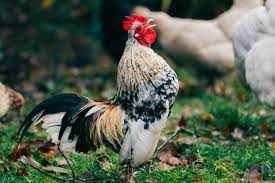We are used to associating the crowing of roosters with the dawn and perceiving them as a natural alarm clock for people in the past. In reality, however, roosters are not crowing just to announce the morning and wake you up. Then why do roosters crow? You will probably be interested to know what scientists have recently discovered on this subject.
Why do roosters crow?
Contrary to popular belief that roosters crowing mostly in the morning at dawn, it turns out that these birds are very vocal and the reasons for crowing are different. They respond to stimuli associated with noise and light. Car headlights, lantern light or noise of any kind can stimulate the rooster to crow. That is, the theory that roosters react to light in the morning is not totally wrong, but the familiar corn can be heard when a lamp is lit or for a number of other reasons. However, ornithologists prove that roosters know when morning comes and croak because of it. Researchers from the University of Nagoya in Japan study the behavior of roosters, dividing them into two groups – one lives in conditions where the darkness of night naturally changes with the light of morning, and the other spends his time in 24-hour darkness. Scientists have proven that both groups of roosters crowing shortly before dawn.
That is, roosters in the morning do not just react to dawn and light, and their crowing is associated with a biological clock, which tells them that the morning is approaching, even if they live in complete darkness for days. The experiment continues with a third group of roosters, which suddenly ignited a light source – a lamp. When the light came on, no matter what time it was and whether morning was approaching or midnight, the roosters reacted and crowed. This proves that they also react to light. However, the experiment also proves something else that helps us answer why the roosters crow, namely – at dawn when the lamp lights up, the reaction of the roosters was the strongest. That is, roosters crowing both because of the dawn and because of the presence of a light source, one of which does not displace the other and does not necessarily overlap, and the presence of the brightest and strongest crowing at dawn and less when scientists trying to deceive birds with a light source, proves that the biological clock of roosters is stronger than other factors. Yet dawn is far from the only reason for crowing, as the old people thought.
Obviously, the answer to the question why roosters crow is not clear, the reasons may be: noise, light, presence of people or animals, guarding the territory, claiming supremacy, “marking” the territory, communicating with peers, after mating, during or after a meal, due to the approach of morning.
In 2019, a Swiss court sentenced a rooster not to crow at night
A resident of the canton of Zurich has filed a lawsuit over a rooster crowing at night, the Neue Zurich Zeitung reports. The owner of the rooster is obliged to ensure the “silence” of the bird from 22.00 to 8.00 in the morning on weekdays and Saturdays, and on Sunday – from 22.00 to 9.00. At the specified time the rooster is forbidden to leave the henhouse and he will sit there in complete darkness. The court also ordered to improve the sound insulation of the chicken coop.
Before filing the lawsuit against his neighbor, who set up a chicken coop in the garage next to his house, the plaintiff registered how many times the rooster crowed. He found that the bird and day and night corn on average between 14-44 times per hour. The sound it emits is heard at a distance of 15 meters and reaches 84 decibels. The court questioned the accuracy of this data, measured using a mobile phone. He accepted the evidence as “conditionally acceptable”. The applicant also complained about the smell. The applicant initially requested the complete demolition of the chicken coop, but the cantonal court rejected this request. Its decision stipulates that every citizen can pursue his hobby at home.









